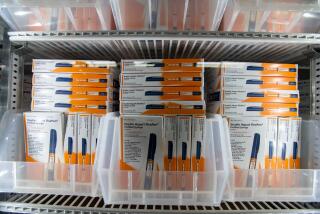Drug Companies Accused of Deceptive Lobbying
- Share via
NEW YORK — The pharmaceutical industry is under fire for bankrolling campaigns in several states that cultivate a grass-roots image while lobbying for drug makers.
Tactics have included funding an obscure group that reached out to advocates for the poor and telemarketing blitzes that urge voters to contact health departments and lawmakers. The common goal is to defeat legislation that would create lists of preferred, lower-cost drugs for Medicaid patients.
Many advocates and public officials said they were caught off guard by the effort. Noting that the industry traditionally uses a more polished approach to lobbying, they see the tactics as an attempt to hide the drug makers’ involvement.
“I’ve never seen anything so sophisticated and done so deceitfully,” said Adam Searing, project director of the North Carolina Health Access Coalition.
At least one activist who participated in events sponsored by industry-funded groups was unaware of the connection. The Rev. Timothy McDonald, president of the Concerned Black Clergy of Atlanta, didn’t know the Consumer Alliance received money from the industry when he joined a news conference in March.
Taking money from the pharmaceutical industry raises questions about the group’s integrity, he said.
He said knowing of their involvement would not have affected his opposition to the drug lists, known as formularies, but he added, “It makes me really uneasy they didn’t tell us.”
Pharmaceutical representatives say they intended no deceit, noting that they had issued a news release announcing their relationship with the Consumer Alliance.
Still, the industry has pledged to be more forthright in lobbying against formularies.
“We’ll have to be more upfront about our conducting an educational campaign,” said Jeff Trewhitt, a spokesman for the Pharmaceutical Research and Manufacturers of America, the industry’s Washington-based trade organization.
The industry argues that formularies are an unfair form of price control and also infringe on doctors’ decisions to choose the best drug.
Several states, including California, Florida and Michigan, have adopted them to curb spiraling Medicaid costs. Under their programs, pharmaceutical companies agree to provide discounts in exchange for having their products included. Doctors need special permission to prescribe unlisted drugs.
More to Read
Sign up for Essential California
The most important California stories and recommendations in your inbox every morning.
You may occasionally receive promotional content from the Los Angeles Times.










